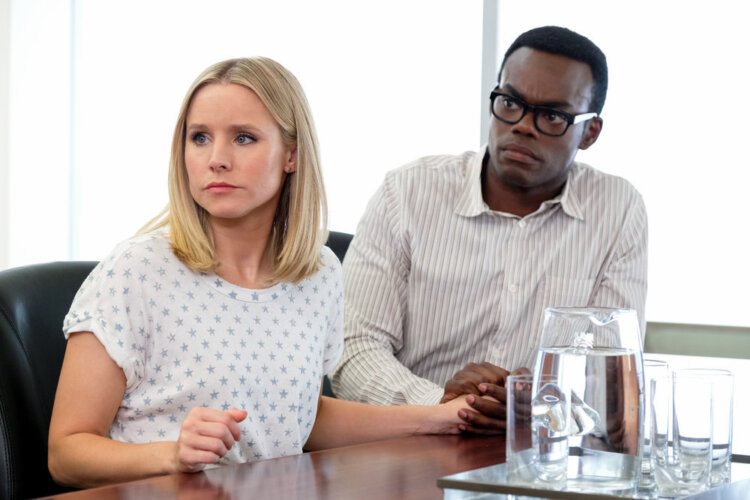
Aside from being one of the weirdest, funniest, and most charming shows on television, The Good Place remains, after three seasons, one of the most profound explorations of ethics on the small screen. On last night’s season 3 finale, it once again played to its strengths: twisting and turning in plot and doubling down on exploring what it means to be good through its likable characters.
Throughout the series, The Good Place has drawn on general religious sensibilities, particularly medieval, Dante-informed versions of heaven and hell, peppered with modern sensibilities for comic effect (William Shakespeare’s eternal punishment is being forced to listen to the plot of the Entourage movie). In the show’s version of the afterlife, a person’s time on earth is scored on a points system to determine where they end up, which doesn’t feel so far from popular American evangelicalism. But The Good Place embraces a shallowly religious premise in order to sneakily elevate a conversation about what it means to be good in a confusing world.
[Warning: A few spoilers from the season 3 finale to follow.]
From the first episodes, The Good Place has been impossible to predict. The plots constantly twist and turn—“This isn’t the Good Place?” “Michael’s a demon?” “Michael’s a good demon?” “They’re going back to earth?” And, a crucial one: “Nobody’s made it to the Good Place in 500 years??” These plot twists allow for interesting ethical questions to arise. Season 1 could be characterized as asking: Is a person good or bad by default, or can people change? Season 2 plays this out in dramatic fashion, and then asks its own more specific question: Is a gentle push on the right path all that is needed for someone to go from being bad to good?
Season 3 may be asking the most profound question yet, in light of the revelation that nobody has made it to the Good Place in 500 years. Is it even possible, given the complexity of the world, to still be good? Per the show’s example, the simple action of buying a tomato, which 500 years ago would have had few ethical repercussions, has moral implications today that include the use of pesticides and unjust labor practices toward the people who picked it.
Is it even possible, given the complexity of the world, to still be good?
Is it just too hard to be good now? Are we off the hook that easily… or are we that doomed? The revelation is either a free pass or an unavoidable condemnation. That The Good Place is willing to explore such anxious territory, while being one of the funniest shows on television, is a gift. Last night’s finale offered a break from the twists and philosophizing to give us its most emotional episode yet, meditating on the meaning of life–not in a textbook but through an emotional moment of love being lost.
The Judge (Maya Rudolph) gives Michael (Ted Danson) an opportunity to re-create his “Good Place” with four “bad” humans to see if they can learn to be good, to make better decisions when they are free from the pressures of our world. This leaves Eleanor (Kristen Bell), Chidi (William Jackson Harper), Tahani (Jameela Jamil), Jason (Manny Jacinto) and Janet (D’Arcy Carden) as a support system; they will live in the neighborhood and help these four souls be better.
And while it’s true that the world is infinitely more complex now than it was 500 years ago, I would argue that—while it might be easier than ever to perpetuate evil unknowingly—it is easy as it has ever been to be good. Just like the Soul Squad have learned countless times, the best way to become better and do good is to find our common hope in one another, teaching and learning from each other’s experience, and in sacrificing for each other.
That’s ultimately what Chidi has to do: give up his relationship with Eleanor for the good of the group, and the good of humanity. See, the Bad Place plays a trick and chooses his ex-girlfriend Simone (Kirby Howell-Baptiste) to be one of the human candidates for this experiment. Since Chidi won’t be able to help the group fully without feeling guilt and mixed emotions for Simone being there. He’s has Michael remove his memories, including the ones where he falls in love with his current girlfriend, Eleanor.
And so a quirky comedy like The Good Place, strangely religious and humanist and philosophical, reminds us that the best teachings we have on what it means to be good are the ones that call us back to one another, the personal, the sacrificial.
In Chidi’s sacrifice, and the words shared between Eleanor and Janet about the search for euphoria in the midst of pandemonium, we are reminded of the necessity of love to take us where we need to go. It’s why the greatest commandment is to love one another, and the hardest commandment is to love your enemies. Love—the kind that’s willing to sacrifice its own interest for everyone, anyone—is the best and only instinct we have to do what is right, no matter how complicated the world gets. It always has been, and it always will be.


Grok Nation Comment Policy
We welcome thoughtful, grokky comments—keep your negativity and spam to yourself. Please read our Comment Policy before commenting.